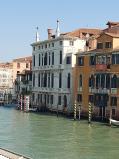Arts Faculty News
History of the NHS: BBC CWR Interview
The NHS celebrates its’s 75th anniversary this year. From birth to death, and everything in between, the NHS is there throughout most of our lives. But what do you think was one of the biggest causes of death in the UK before the NHS came into being? Diseases? Childbirth? Leukaemia? BBC CWR Reporter Tom Cooke has been out to meet Professor Roberta Bivins from the Centre for the History of Medicine in Warwick's Department of History, who has been looking at the impact that the NHS has had on UK society and reveals what the biggest killer of people was before we had the NHS.
Why Warwick is investing more than ever in arts and humanities
Recently, we shared more about our new home in Venice, just one of the ways Warwick is reconfirming a deep commitment to the arts.
In this article for the Times Higher Education (THE), Stuart Croft, our Vice-Chancellor, talks about the importance of backing both STEM and the arts, and why Warwick is investing more than ever in arts and humanities.
You can view the article on the THE website (first published 26 June 2023) or read it below.
British Academy/Wolfson Fellowships Award for Dr James Poskett
The British Academy/Wolfson Fellowships Awards will be providing funding to Dr James Poskett, Associate Professor in the History of Science and Technology at the University of Warwick.
Through his research, Dr Poskett will be working on a project titled ‘The Scientific Revolution as Global History, 1200-1800’. He hopes this will provide a major reassessment of the concept of the ‘scientific revolution’. In doing so, the project will build on Dr Poskett’s recent book ‘Horizons: A Global History of Science’.
Warwick with Venice: New Venue Opening Event 22 May

The University of Warwick is proud of its long-standing connections with Venice. Our History and History of Art departments have collectively taught students in Venice for well over 50 years. From 2007, the University had a base in the Cannaregio district of the city. Other departments, including Italian Studies, WBS, Global Sustainable Development, Economics, WMG, and the Centre for the Study of the Renaissance, also used this space to deliver short courses and host academic conferences.
Circumstances necessitated the search for a new premises. After an interim period during which we were hosted by Ca’ Foscari, a new location was identified: the Palazzo Giustinian Lolin.
The opening event for the new venue was held on the 22nd May followed by a series of bi-lateral meetings between academics from Warwick and their counterparts from Ca' Foscari University on the 23rd May.
Quickfire questions with PhD Scholarship student, Dr Kimberley Thomas
We caught up with Dr Kimberley Thomas (BA History 2010, MA History 2012, PhD Caribbean Studies, 2020) to talk about her time at Warwick, ahead of her return to deliver a Caribbean seminar series.
How the Past Informs the Present
Features writer and editor for The Boar, Vice President of Warwick HisSoc and Deputy Editor of Warwick Politics Society’s Perspectives, alumna Celia Bergin (BA History and Politics, 2022) certainly made the most of her time at Warwick. Graduating with a first-class degree, she jumped straight into the world of journalism. Now working as a reporter for Bloomberg News, Celia reflects on how these experiences helped her get there.
Let Them Eat Quiche: A Culinary History of Coronation Food
In conversation with The Independent Professor Rebecca Earle, from the University of Warwick said. "This is a genuine innovation. Historically, members of the public were not urged to celebrate coronations by inventing new dishes, or by recreating the menus of the official banquets. Home cooks hoping to replicate the côtelettes de bécassines à la Souvaroff served at Edward VII’s 1902 coronation would have confronted a complex recipe involving fillets of snipe, pâté, brandy and truffles,” she says.
“The method was later described in royal chef Gabriel Tschumi’s cookbook [Royal Chef: Recollections of life in royal households from Queen Victoria to Queen Mary], but it was unlikely to inspire any but the most intrepid.
“Today’s efforts to encourage us all to join in by baking a coronation quiche reflect the enormous popularity of cooking as a leisure activity, as well as the monarchy’s attempts to repackage themselves for the 21st century.”
Rules of Engagement: the Five Rules of Love in Regency England
Professor Sarah Richardson from Warwick's Department of History talks to MyScienceLink opens in a new window about the ‘Rules of love in Regency England’ with creative links to the hit Netflix series, Bridgerton.
What went wrong with Britain's National Health Service?
Professor Roberta Bivins from University of Warwick's Centre for the History of MedicineLink opens in a new window talks to NPR's Philip Reeves as he reports on why Britain's National Health Service is living through what some see as the worst crisis in its history.
Cosmati Pavement: Coronation
For more than 150 years kings, queens and cardinals have been among the few people permitted to tread on one of Britain’s greatest treasures: a medieval mosaic foretelling the end of the world.
Made with rare marbles, glass and gemstones, the Cosmati Pavement in Westminster Abbey is the exact spot on which British monarchs have been crowned for centuries.
Days after the coronation of the King, the 700-year-old artwork will be opened to the public for the first time — on condition that they remove their shoes.
Professor Jennifer Alexander, an art historian at Warwick University, said the pavement tours would “certainly be a rare opportunity for the public to walk in the footsteps of medieval kings”.
She said it was “entirely fitting that they should be barefoot, as medieval pilgrims to St Edward’s shrine would have been”.
